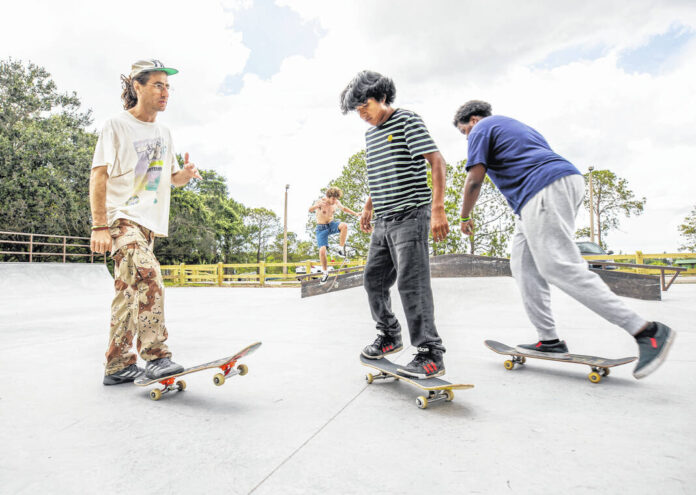ORLANDO, Fla. — In skateboarding’s nearly 80-year history, skaters have turned to the culture and art form as a way to fit in and bond over a shared passion.
Historically, teens hanging out at skateparks have been thought of as disrespectful delinquents and misfits. Over time, those misconceptions have largely vanished, leaving a broad acceptance of the activity as a safe way to get outdoors and a chance for personal growth.
For all of its grassroots gusto and opportunity for outcasts, Zach Moldof, a Jewish Floridian and skateboard anthropologist, recognizes that not everyone who might enjoy skateboarding has access to the culture. He hopes to unite communities and eliminate barriers to skating through his nonprofit, Skate Bud.
“We make skateboarding more accessible through prioritizing disenfranchised communities,” Moldof said.
The skate evangelist previously expressed himself through journalism and hip-hop music before turning his full attention to skateboarding. Skate Bud first started in Los Angeles as a way to help skaters find parks before Moldof, a Broward County native, moved back to Florida with his wife and son in 2022 with community outreach in mind.
“Kids don’t get a lot of opportunities to get positive encouragement from adults who are not authority figures,” he said. “If you’re 13 and I’m 42, and we’re both trying at something and failing, you’re encouraging me and I’m encouraging you.”
The work of expanding skateboard accessibility comes at a critical time for American teens. According to data from the Centers for Disease Control and Prevention, 44 percent of high school students felt persistently sad or hopeless in the year following the onset of the COVID-19 pandemic. From 2011-2021, the CDC saw “significant increases in the percentage of youth who seriously considered suicide, made a suicide plan, and attempted suicide.”
A yearlong study of skateboarding culture, “Beyond the Board,” highlights the ways that skating helps youth have fun, relieve stress, stick with challenges, build relationships and find creative expression.
Moldof understands on a personal level that teens may have a layered and complex way of viewing the world, and also the ways they may benefit from spending time at the skate park.
“Kids, like me, are complicated — kids who get arrested and kids who deal with the kind of stuff that I’m trying to address. They don’t have a simple, easy way of life or looking at the world,” he said. “It allows young people to have that curiosity and to feel comfortable being vulnerable.”
In his Central Florida work, Moldof is spending his Friday afternoons at Barnett Park inviting kids of all ages to come out and learn skateboarding on loaner boards. Beyond Orlando, the Skate Bud book can help beginners learn all the ins and outs of tricks, trucks and skateboard culture.
At the same time, Moldof is advocating for more state parks and eventually getting skateboards into places where they can be checked out to the public, like libraries and recreation centers.
If a rising tide lifts all ships, maybe skateboarding can help lift youth to a new echelon of society, if only they’re given a chance.
“I feel like I’m still that 21-year-old trying to prove that I’m not bad, and I also know that nobody is going to give someone like me a chance,” Moldof said. “My only option is finding a way to make a door so big we can all fit through.”
To learn more, visit skatebud.com.







